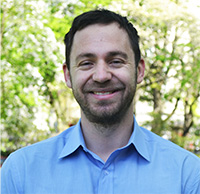Joukowsky Family Foundation Outstanding Dissertation Awards
The prizes recognize superior achievements in research by students completing the doctoral degree. This year the research topics range from writings on the lives of saints to gene activity in fruit flies and novel solutions for database security to the validity of an instrument for causal inference in observational studies in economics.
Supported through the generosity of the Joukowsky Family Foundation, up to four awards are made, with one from each of the four main areas: the humanities and the life, physical and social sciences.
 Reyhan Durmaz, Religious Studies, came to Brown with master’s degrees in Medieval Studies from Central European University in Budapest and in Archeology and Cultural Heritage Management from Koç University in Istanbul.
Reyhan Durmaz, Religious Studies, came to Brown with master’s degrees in Medieval Studies from Central European University in Budapest and in Archeology and Cultural Heritage Management from Koç University in Istanbul.
Her research examines hagiography as a medium for Muslim-Christian exchange, considered through the formation of the Qur’an and its exegetical traditions, and through the cult of saints. She looks at saints’ stories as transactional media: narratives that allow for, and give evidence for, religious exchange, interaction, and transformation. Her dissertation is titled, Stories, Saints, and Sanctity between Christianity and Islam in the Middle Ages.
Portions of her dissertation have been accepted for publication in two edited volumes on Syriac Studies, titled Syriac Christian Culture: From Beginnings to Renaissance and Syriac Hagiography.
“I have watched Reyhan rise to meet the challenging struggles of a truly interdisciplinary scholar. Since she works in both Christianity and Islam, she is well aware of the multiple audiences for her work—each of which require mastery of a vast amount of secondary literature,” says one of her advisors, Nancy Khalek Associate Professor of Religious Studies.
She was a Junior Fellow in Byzantine Studies at Dumbarton Oaks Research Collection and Library in Washington, DC, this academic year, and she holds a Charlotte Newcombe dissertation fellowship from the Woodrow Wilson Foundation.
This coming fall Durmaz will join the department of Religious Studies at the University of Pennsylvania as an Assistant Professor of Religious Studies.
“It is a great honor to receive this award and an invaluable encouragement towards the future steps of my research. I am immensely thankful and indebted to the community of mentors and colleagues that made it possible,” says Durmaz.
 William Jordan, Molecular Biology, Cell Biology and Biochemistry, is the first in his program to participate in Brown’s Open Graduate Education Program. Jordan has earned a master’s degree in Data Science and completed his PhD within five years.
William Jordan, Molecular Biology, Cell Biology and Biochemistry, is the first in his program to participate in Brown’s Open Graduate Education Program. Jordan has earned a master’s degree in Data Science and completed his PhD within five years.
Prior to Brown, Jordan earned his bachelor of science degree at Virginia Tech, then joined a biotech company, where his mentors recognized his talent and encouraged him to apply for PhD programs.
Jordan’s research focuses on how the three-dimensional structure of a chromosome influences gene activity. He examined the X chromosomes in fruit flies in his thesis, Drosophila Dosage Compensation as a Model for Combinatorial Transcriptional Regulation. He defines for the first time how the shape of the X chromosome and its patterns of intrachromosomal contacts contributes to the systematic two-fold increase in gene activity in male fruit flies.
Jordan hypothesized that a key regulatory protein controls the three-dimensional folding of the X-chromosome in the nucleus of the cell. To test his hypothesis, he used a cutting-edge method to determine DNA-DNA contact points along each folded chromosome in normal cells versus cells lacking the regulatory protein.
As a result, Jordan has defined a new mechanism by which active genes are clustered in three-dimensional space to coordinate their regulation.
“One remarkable aspect of William’s thesis compared to other students is that all of the data in his thesis was entirely generated by him with no major contributions from other members of the laboratory. Most impactful papers from my group require a large team of authors from multiple research groups around the country or internationally,” says Erica N. Larschan, Richard and Edna Salomon Associate Professor of Biology.
During his time at Brown, Jordan received an HHMI Gilliam Fellowship and an NSF Graduate Research Fellowship. A part of his dissertation is published in Trends in Genetics. Another chapter has been recently submitted for publication and is currently out for peer review.
Jordan will remain at Brown through this summer in Larschan’s lab completing research and preparing several manuscripts for publication.
“Things have not been easy in this PhD journey and the award was never something that was on my radar. It was an exciting honor to have been nominated and I feel very blessed and am thankful to have been selected. It also helps me to put all the graduate school related sacrifices I've made into further context,” says Jordan.
 Evgenios Kornaropoulos, Computer Science, will be honored for his dissertation, Information Leakage in Encrypted Systems Through an Algorithmic Lens.
Evgenios Kornaropoulos, Computer Science, will be honored for his dissertation, Information Leakage in Encrypted Systems Through an Algorithmic Lens.
“Evgenios’s research work combines deep insights and sophisticated algorithmic methods to develop novel solutions for security problems that are highly relevant in practice,” says Roberto Tamassia, Plastech Professor of Computer Science.
As the volume and complexity of generated data grows, users would like to run expressive data queries, while keeping their data safe. Encrypted databases are one of the most promising approaches towards this direction.
“Evgenios’s thesis takes a rigorous approach to build a scientific foundation for the study of the vulnerability of searchable encryption against reconstruction attacks under realistic assumptions, thus aiming at both theoretical and practical impact,” says Tamassia.
Kornaropoulos’ research uses an algorithmic approach to develop powerful attacks on encrypted databases. Specifically, his dissertation shows how to craft state-of-the-art attacks by using tools from computational geometry, learning theory, statistics, and optimization. These techniques achieve the first accurate reconstruction of the encrypted data under realistic assumptions, thus demonstrating that it is possible to breach these cryptographic designs.
Two of the three chapters from Kornaropoulos’ dissertation have already been published in the flagship venue of computer security IEEE Symposium on Security and Privacy as well as in IEEE European Symposium on Security and Privacy.
In addition to his dissertation, Kornaropoulos has done other important research in privacy, including work at the intersection of machine learning and computer security, two fast-growing fields that are becoming increasingly intertwined, and an investigation of the security of data storage methods against forensic recovery attacks, with applications to the emerging field of electronic voting security.
In September, Kornaropoulos will start as a Postdoctoral Researcher at the University of California Berkeley.
Before coming to Brown for his PhD in Computer Science, he earned a professional degree from Synchronous Conservatory in Crete in Classical Guitar while completing his undergraduate and master’s studies in University of Crete in Greece. “Elegance can come from an insightful mathematical solution as well as a beautiful musical phrase,” he says.
“It means a lot to receive such recognition from my academic community. I will do my best to continue on this trajectory in my future endeavors,” says Kornaropoulos.
 In his thesis, Florian Gunsilius, Economics resolves two central open questions in his field. First, he proved what is widely known in the field as Pearl’s conjecture, which hypothesized that it is impossible to test the validity of an instrument for causal inference in observational studies when the treatment of interest is contaminated and continuous.
In his thesis, Florian Gunsilius, Economics resolves two central open questions in his field. First, he proved what is widely known in the field as Pearl’s conjecture, which hypothesized that it is impossible to test the validity of an instrument for causal inference in observational studies when the treatment of interest is contaminated and continuous.
His second contribution is a partial identification result which derives sharp bounds on causal effects in controlled trials and observational studies with contaminated treatments. His dissertation is titled, Essays in Nonparametric Econometrics.
“Overall, Florian has a unique ability to perform independent research and an exceptional work intensity. He is also eager to attack hard problems. He is able to quickly grasp and assimilate very technical papers in very diverse literatures. Advising him has been a joy and indeed a learning experience for myself,” says Susanne M. Schennach, Professor of Economics.
While at Brown Gunsilius was awarded the Chancellor Stephen Robert Fellowship and a teaching award, best paper prize and the George-Borts Dissertation prize from the department of Economics.
Currently two parts of his thesis are in the revise and resubmit stage at top journals in the field of Economics. A third part has been submitted, and the fourth part will be submitted shortly.
Gunsilius shares that as a first-generation student he did not have the most streamlined path towards his PhD in Economics. He completed his undergraduate degree in Management, Philosophy, and Economics at the Frankfurt School of Finance and Management in Germany.
“I am very proud to have won this award. Brown took a chance with me, as it is usually not the case that someone with my background gets the chance to pursue a PhD in Economics at such a prestigious institution,” says Gunsilius.
Gunsilius has accepted a position at the University of Michigan, which he will join after completing a one-year postdoctoral fellowship at the Massachusetts Institute of Technology.
“I can honestly say that my studies at Brown have overall been the best time of my life, with an outstanding environment. I also looked at recipients from previous years, and it is quite unreal for me to be part of this circle of outstanding researchers,” he says.